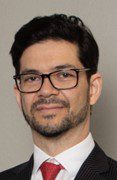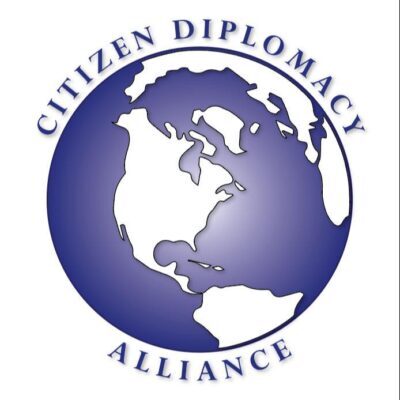Mexico’s Consul in Tucson, Rafael Barceló Durazo

In November we heard from the current U.S. Consul General to Nogales, Sonora, Laura Biedenbach, whose chat was moderated by our former Consul General to Nogales, Sonora, Virginia Staab. In the recap of that meeting, I mentioned that it was such a pleasure and privilege to have a glimpse of both the recent history and the future of the border region through the eyes of two of our diplomats who are helping to shape it. Those feelings were further deepened as we heard from their counterpart, Rafael Barceló Durazo, Consul from México to Tucson.
Since arriving in Tucson in August 2020, Rafael has demonstrated his love, appreciation, and understanding of our region as someone who grew up in Sonora. And he has fully demonstrated his support of Citizen Diplomacy Alliance and our close partner, Pima Community College.
Beginning his talk by clarifying the difference between an Embassy-focused on national and international relations—and a Consulate—focused more on regional interests such as well-being of Mexican citizens living here and commercial and educational interests, as well as working on local challenges shared by our two countries. He emphasized that strong cross-border collaborations between our two regions as he described the “complex and close relationship between our two nations.â€
Among the challenges faced by both sides of the border he mentioned drug and human trafficking, the fight against money laundering, and immigration—coming into both Mexico and the U.S. via our southern borders.
And he again mentioned our many “links making us natural partners.†Especially since NAFTA, we are complementary, not competitors.â€
With 35 million Mexican citizens living in the U.S., no other country has as many “ex-pats†here, and “service to nationals has risen to the highest priority. Not only visa and passport services, but “Consular Protection†for citizens is primary. Considering linguistic barriers alone, the Consulate is proactive in helping nationals to navigate complex and different health and legal systems, and act as “cultural liaisons†to help open doors to resources for protection and support. In fact, the Mexican Consulate provides significant funding to the health care system her, primarily to El Rio. They also support education with generous support to PCC and help with resources such as childcare. To support financial education to “empower individuals to better integrate into society, they collaborate closely with the Hispanic Chamber of Commerce and other organizations.
When he spoke about the “very complicated issue of immigration†in both the U.S. and México, he mentioned Mexico’s strong leadership role in the United Nations on this topic and spoke of how México is working to reframe the concept. The U.S. eyes immigration as a problem. And Mexico sees it as a “natural phenomenon†At the center of this phenomenon is the person who is migrating because of economics and violence and trying to save their own lives. Implicit in this is the need to stop the desperation and reasons for fleeing homelands. It is an international phenomenon and needs to be addressed through international collaboration.
As to questions of Mexico’s economic stability, he mentioned that the economy has been completely stable for the last 30 years, but like the U.S., inflation is an issue there with scarcity of products and high demand. Underemployment rather than unemployment is the issue.
He mentioned that foreign trade never stopped in Mexico during the pandemic primarily due to the natural, strong link between our two countries. And with the extended border closures families that used to cross for shopping spent their money at home allowing many merchants to thrive. As the border reopened in November, fears of overwhelming crowds trying to cross in both directions were unfounded. “It was orderly and great!’
A warm and engaging speaker, Rafael’s talk about his role and his vision for what is and what could be was insightful and even reminiscent of the vision we heard from his counterparts, Laura, and Virginia. Yes, there is no doubt that there are complex challenges. But from both sides of the border, we heard that there is also a close relationship and a strong determination to resolve those challenges together. We now have had a glimpse of both the recent history and the future of the region through the eyes of three of our diplomats who are shaping it. And it brings hope.
In November we heard from the current U.S. Consul General to Nogales, Sonora, Laura Biedenbach, whose chat was moderated by our former Consul General to Nogales, Sonora, Virginia Staab. In the recap of that meeting, I mentioned that it was such a pleasure and privilege to have a glimpse of both the recent history and the future of the border region through the eyes of two of our diplomats who are helping to shape it. Those feelings were further deepened as we heard from their counterpart, Rafael Barceló Durazo, Consul from México to Tucson.
Since arriving in Tucson in August 2020, Rafael has demonstrated his love, appreciation, and understanding of our region as someone who grew up in Sonora. And he has fully demonstrated his support of Citizen Diplomacy Alliance and our close partner, Pima Community College.
Beginning his talk by clarifying the difference between an Embassy-focused on national and international relations—and a Consulate—focused more on regional interests such as well-being of Mexican citizens living here and commercial and educational interests, as well as working on local challenges shared by our two countries. He emphasized that strong cross-border collaborations between our two regions as he described the “complex and close relationship between our two nations.â€
Among the challenges faced by both sides of the border he mentioned drug and human trafficking, the fight against money laundering, and immigration—coming into both Mexico and the U.S. via our southern borders.
And he again mentioned our many “links making us natural partners.†Especially since NAFTA, we are complementary, not competitors.â€
With 35 million Mexican citizens living in the U.S., no other country has as many “ex-pats†here, and “service to nationals has risen to the highest priority. Not only visa and passport services, but “Consular Protection†for citizens is primary. Considering linguistic barriers alone, the Consulate is proactive in helping nationals to navigate complex and different health and legal systems, and act as “cultural liaisons†to help open doors to resources for protection and support. In fact, the Mexican Consulate provides significant funding to the health care system her, primarily to El Rio. They also support education with generous support to PCC and help with resources such as childcare. To support financial education to “empower individuals to better integrate into society, they collaborate closely with the Hispanic Chamber of Commerce and other organizations.
When he spoke about the “very complicated issue of immigration†in both the U.S. and México, he mentioned Mexico’s strong leadership role in the United Nations on this topic and spoke of how México is working to reframe the concept. The U.S. eyes immigration as a problem. And Mexico sees it as a “natural phenomenon†At the center of this phenomenon is the person who is migrating because of economics and violence and trying to save their own lives. Implicit in this is the need to stop the desperation and reasons for fleeing homelands. It is an international phenomenon and needs to be addressed through international collaboration.
As to questions of Mexico’s economic stability, he mentioned that the economy has been completely stable for the last 30 years, but like the U.S., inflation is an issue there with scarcity of products and high demand. Underemployment rather than unemployment is the issue.
He mentioned that foreign trade never stopped in Mexico during the pandemic primarily due to the natural, strong link between our two countries. And with the extended border closures families that used to cross for shopping spent their money at home allowing many merchants to thrive. As the border reopened in November, fears of overwhelming crowds trying to cross in both directions were unfounded. “It was orderly and great!’
A warm and engaging speaker, Rafael’s talk about his role and his vision for what is and what could be was insightful and even reminiscent of the vision we heard from his counterparts, Laura, and Virginia. Yes, there is no doubt that there are complex challenges. But from both sides of the border, we heard that there is also a close relationship and a strong determination to resolve those challenges together. We now have had a glimpse of both the recent history and the future of the region through the eyes of three of our diplomats who are shaping it. And it brings hope.
Submitted by Patricia Houston, VP of Citizen Diplomacy Alliance
